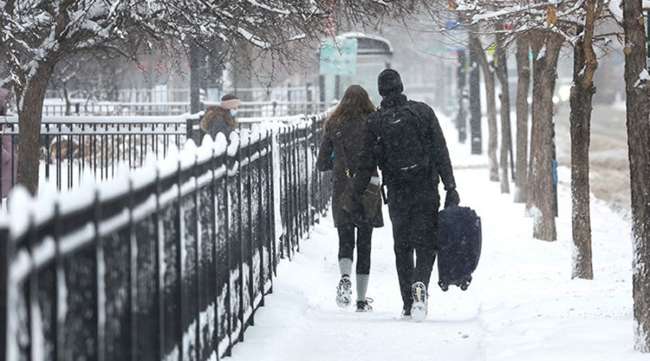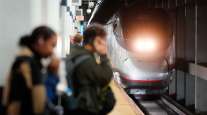Winter ‘Bomb Cyclone’ Bears Down on Chicago Ahead of Holiday Travel Rush

[Stay on top of transportation news: Get TTNews in your inbox.]
Chicago is in the crosshairs of a powerful winter storm that could become a “bomb cyclone” — with deep snow, searing winds and an Arctic chill — threatening to disrupt Christmas travel for millions of people in the U.S. and bring a deep freeze to the eastern two-thirds of the country.
While the city, a major U.S. air hub, may only get 5 inches of snow starting the night of Dec. 21, it will be hit with winds that could make temperatures feel like minus 35 F, according to the National Weather Service.
United Airlines Holdings Inc., Delta Air Lines Inc., American Airlines Group Inc. and others have issued travel waivers so passengers can rebook holiday travel with no fees. An estimated 112.7 million people are expected to travel 50 miles or more from Dec. 23 to Jan. 2, according to automotive group AAA. Meanwhile cold reaching deep into Texas and Florida will make being outside miserable.
“Over two-thirds of the country has something related to this system,” said David Roth, a senior branch forecaster at the U.S. Weather Prediction Center. “About the only places not impacted are parts of the Great Basin, the Southwest, Hawaii and Puerto Rico.”
Roth said the storm will strengthen as it moves east and will certainly meet the criteria needed to be classified as a bomb cyclone. The classic definition is when a storm’s central pressure, a measure of its strength, drops 24 millibars in 24 hours.
Chasing the storm — which will also hit eastern Canada and trigger lake-effect snow across the Great Lakes — is a cold front that will send temperatures plunging for the eastern two-thirds of the U.S. That will drive a frigid wedge as far south as Texas and central Florida, boosting energy demand as people turn up their thermostats to beat the chill.

Host Michael Freeze relays the story of a cybersecurity crisis at a transportation and supply chain management company and discusses strategies to avoid cyberattacks with a 30-year veteran of automotive cybersecurity systems. Hear a snippet, above, and get the full program by going to RoadSigns.TTNews.com.
The worst of the cold will strike the Great Plains, but below-freezing temperatures will reach deep into Texas and are possible even in Orlando, Fla., said Don Keeney, a meteorologist with commercial forecaster Maxar. The frigid air could lead to winter kill of wheat crops in parts of Kansas, Colorado, Oklahoma and northwest Texas.
“This is going to be as cold as I have seen it in the central Plains in probably 20 years,” Keeney said. “It is going to be very intense.”
The Texas energy grid is being closely watched because another sharp cold snap brought it to its knees in February 2021. This current event isn’t expected to last as long. The low in Dallas is forecast to hit 11 F, with the wind-chill making it feel closer to minus 6 F in places.
The snow will likely miss New York and the other big cities in the Northeast, but rain and high winds could buffet the region before temperatures plummet.
Much of the region will be battered by high winds, Keeney said.
Readings in Manhattan’s Central Park will hit a high of 54 F Dec. 23 before dropping to 15 F later, the weather service said. A high-wind watch, with gusts of as much as 65 mph, has been issued for Boston and parts of New England. There is a chance of widespread power outages across much of the U.S.
After the storm sweeps across the U.S., it is forecast to bring snow and rain across eastern Canada. The heaviest snow will likely miss Toronto, but the city could find itself in the midst of a flash freeze when temperatures drop, according to Environment and Climate Change Canada. On both sides of the border, the cold air and relatively warm water in the Great Lakes will lead to heavy snowfall on the eastern shorelines.
Temperatures will start to rebound on Christmas Day, except in the South where the cold could linger for a few days, Roth said.
— With assistance from Mary Schlangenstein.
Want more news? Listen to today's daily briefing below or go here for more info:




